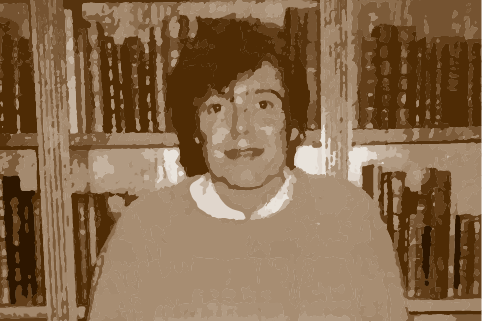The Interviews
Simon Finch
[Bowling Them Over]
‘There’s nothing interesting about my business. I buy books and then try to sell them.’
It was a wobbly start for which I was unprepared. Clearly someone had said something to Simon not entirely to my advantage. He was going to watch his every word as we both glanced furtively at the yards of empty tape unreeling between us.
Apparently female interviewers have a fiercesome reputation for being out-and-out cows on the rampage — an untruth, Heaven knows. But there was little I could do to reassure Simon who had taken fright when my horns first pierced the door.
The facts are that Simon started buying and selling books at university and moved straight into the trade, firstly as a runner and later taking shops. Things really took shape when he began producing catalogues with his great friend Adam Douglas. Their partnership continues to thrive, although Adam is primarily a writer, currently at work on a book about werewolves. He still contributes many of the elegantly writ-ten descriptions in Simon’s catalogues and deals with much of the bibliographical side of the business.
‘I think my talent is for buying books. I get impatient with collating. I learned a lot about 18th century literature from John Manners when he was at Blackwell’s. But this country has become less and less fertile ground and I have had to diverge from English literature. There simply is not enough to meet the overheads of a Bond Street operation, and I have to splash out to buy more substantial things. Nowadays I deal in all sorts — incunabula, literary portraits, the odd medieval manuscript.’
The Bond Street operation is situated in a stylish suite of rooms overlooking Asprey, decorated with the most ravishing hand-painted linen curtains. Simon still keeps on his shop in Munster Road largely as a store room for collections.
‘I can’t buy books I don’t like. Today I’m less interested in the 18th century. It’s a difficult game to play — what sells is very minor, unrecorded material and everybody’s looking it up in NUC to see if McMaster have it. I also like auctions less and less. They make me very fidgety and I’m not particularly interested in what all the lots make.
‘When things are going well, bookselling is a fun thing to be in. But when it’s the middle of a recession, I find it deadly dull, looking at the same books and wondering what to do. I need the excitement of something happening.’
Simon attributes his survival, not to say success, to ‘luck and periodic hard work, usually for no more than a few months a year. That’s when I do it all and then wonder why I did it.’ It is an attractive ambivalence that fits well with his leisurely air of not quite trying. ‘Actually I do give the impression of being more laid back than I really am. If I try too hard I only make myself very anxious. When that happens, I just go home and watch cricket on television or go to Lord’s.’
After only a decade in business, Simon is one of the most admired and respected members of the trade. He has just produced his eighth catalogue with a sale value of almost a million pounds. It cost over £30,000 to produce and has been described by no less a catalogue connoisseur than James Fergusson as ‘an astonishing achievement’. Writing in the August issue of ABMR, Fergusson continues his judicious assessment, ‘Finch demonstrates a high gearing which, if he can maintain it, will place him decisively ahead of those, tradition-ally long-standing, London booksellers who have hitherto shared the league crown.
It was Catalogue Eight that contained Brighton Public Library’s copy of Thomas Malthus’ Principles of Political Economy, with David Ricardo’s annotations. Simon spotted the book in a provincial auction and bought it for £42,000 amidst a blaze of controversy about the rights and wrongs of selling library books. Apparently members of the East Sussex County Council felt something akin to robbery when Simon went on to sell the book at a profit to a private collector in the United States. Actually they had also done rather well out of sale in which they were only expecting to make around £8,000. In the September ABMR, John Kinnane took up Simon’s case, ‘The furious members of East Sussex Council would do well to remember that having decided to sell, they have had £42,000 of the bookseller’s money up front; the bookseller had only his own expertise and customer base, built up over many years, to rely upon for his initially unproven profit.’
Actually Simon has rather a talent for publicity. He has been photographed, to give one small example, with no clothes on for Katya Grenfell’s book Naked London, published by Quartet in 1987, with an introduction by Taki. ‘I was absolutely hounded into it, and was taken sitting on a chair in my shop in Munster Road, with no clothes on and looking scrawny and frightened. It wasn't a full frontal, and there was nice lighting and all that rubbish.’
Sitting with all his clothes on, Simon looked more pensive than frightened,'I have doubts whether antiquarian book selling is a viable profession for someone with a family. A generation back, all my relatives were soldiers, lawyers and so on. But my sister is an actress and I'm not sure what my brother is doing. And anyway, if I had been a stock broker, it would have driven me mad.’
Interviewed for The Bookdealer in February 1992
